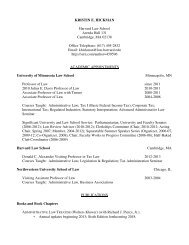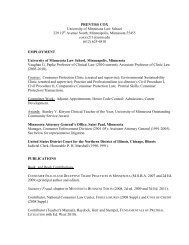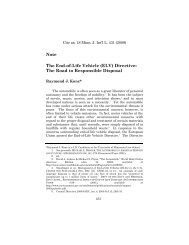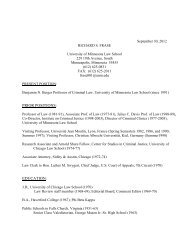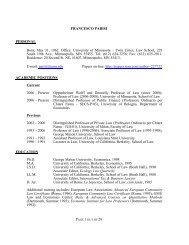Enabling Private Ordering - the University of Minnesota Law School
Enabling Private Ordering - the University of Minnesota Law School
Enabling Private Ordering - the University of Minnesota Law School
Create successful ePaper yourself
Turn your PDF publications into a flip-book with our unique Google optimized e-Paper software.
2009] UMBRELLA CLAUSES 47<br />
about <strong>the</strong> obligations arising under <strong>the</strong> host State’s promise visà-vis<br />
foreign investors. Umbrella clauses thus stabilize investor-<br />
State relations ex post by <strong>of</strong>fering enforcement mechanisms for<br />
investment-related host State promises, independent <strong>of</strong> whe<strong>the</strong>r<br />
<strong>the</strong> breach is <strong>of</strong> a sovereign or a commercial nature.<br />
B. DISSOLUTIONS OF THE DUALIST FRAMEWORK IN<br />
INTERNATIONAL DISPUTE RESOLUTION<br />
What <strong>the</strong> more restrictive line <strong>of</strong> interpretation <strong>of</strong> umbrella<br />
clauses also disregards in its strict emphasis on <strong>the</strong><br />
national/international law divide is that even under customary<br />
international law <strong>the</strong> distinction between contract claims and<br />
treaty claims, respectively municipal law and international law,<br />
was never as categorical as <strong>the</strong> restrictive approach purports.<br />
By contrast, international law has always accepted that States<br />
can submit claims for <strong>the</strong> violation <strong>of</strong> municipal law to<br />
international law dispute resolution, including inter-State<br />
proceedings. Similarly, modern investment treaties <strong>of</strong>ten allow<br />
for <strong>the</strong> settlement <strong>of</strong> both treaty and contract claims based on<br />
broadly worded arbitration clauses. Both <strong>of</strong> <strong>the</strong>se developments<br />
suggest that <strong>the</strong> distinction between claims for <strong>the</strong> violation <strong>of</strong><br />
domestic law and claims for <strong>the</strong> violation <strong>of</strong> international law<br />
does not constitute a rigid distinction that would need to be<br />
prolonged by a restrictive interpretation <strong>of</strong> umbrella clauses<br />
that limits <strong>the</strong> clauses’ scope <strong>of</strong> application to sovereign<br />
breaches <strong>of</strong> investor-State contracts.<br />
1. Contract Claims in Classical Inter-State Dispute Settlement<br />
While customary international law only <strong>of</strong>fers a limited<br />
scope <strong>of</strong> protection to investor-State contracts, it has never<br />
prevented States from submitting pure contract claims to inter-<br />
State dispute resolution. Although States have traditionally<br />
been reluctant to espouse claims by <strong>the</strong>ir nationals for simple<br />
breaches <strong>of</strong> contract by means <strong>of</strong> diplomatic protection, 123<br />
customary international law did not prohibit <strong>the</strong> espousal <strong>of</strong><br />
such claims. In fact, abundant State practice and older<br />
123. The United States, for example, had a long-standing policy not to intervene<br />
with force based on <strong>the</strong> breach <strong>of</strong> an investor-State contract. The reasons for this<br />
were largely <strong>of</strong> a “political” nature. The fact that <strong>the</strong> investor had entered freely into<br />
<strong>the</strong> agreement and voluntarily accepted <strong>the</strong> risk associated with contractual<br />
breaches played a role. In addition, not upsetting inter-State relations was <strong>of</strong>ten<br />
important. See Jennings, supra note 58, at 159, 164, 179–81.




